Auditor General Slams Political Parties Over Shs 842 Million Mismanagement
An audit report has exposed alarming mismanagement of public funds among several political parties in Uganda, revealing a staggering Shs 842.1 million in unaccounted funds. The report, issued by Auditor General John Muwanga, scrutinizes the financial statements of the Uganda Electoral Commission for the fiscal year ending June 2023.
According to the report, at least six political parties failed to maintain proper financial records as required by the accountant general’s guidelines. This lapse in financial oversight is particularly egregious given that the ruling National Resistance Movement (NRM) and the Uganda People’s Congress (UPC) were found in breach of their tax obligations. NRM and UPC have neglected to remit Shs 2.5 billion in Pay As You Earn (PAYE) taxes to the Uganda Revenue Authority (URA) and Shs 173.4 million in National Social Security Fund (NSSF) contributions.
Under the Political Parties and Organizations Act of 2005, the government is obligated to allocate funds to political parties represented in parliament to support their operations. The accountant general’s guidelines mandate that these funds should be disbursed based on agreed work plans and that expenditures must be meticulously recorded. Political parties are required to maintain comprehensive financial records, including cash books, asset registers, and procurement records. They must also prepare periodic financial reports detailing receipts, expenditures, and any unspent balances.
During the audited year, Shs 44.9 billion was allocated to seven political parties. The NRM received the largest share of Shs 34.1 billion, followed by the National Unity Platform (NUP) with Shs 5.7 billion. The Forum for Democratic Change (FDC) received Shs 3.1 billion, the Democratic Party (DP) and Uganda People’s Congress (UPC) each got Shs 908 million, Justice Forum (JEEMA) was allocated Shs 100.9 million, and the People’s Progressive Party (PPP) received Shs 100.8 million.
The audit revealed several significant issues with fund utilization. Key among them was the failure of some parties to prepare annual work plans. JEEMA, DP, and FDC did not provide work plans corresponding to the fiscal year 2022/2023, which is a critical requirement for fund allocation. Auditor General Muwanga expressed his inability to verify whether the funds were properly used, noting that parties should have prepared specific work plans for the financial year in question.
The report underscores the importance of adherence to financial accountability standards. Six parties were cited for failing to maintain adequate financial records. JEEMA did not keep the required registers for assets, stores, and procurement records, and also failed to provide a statement of unexpended balances. The PPP’s financial statements lacked budgetary comparisons, while the DP’s statements were incomplete, missing critical details such as opening and closing balances. The FDC’s statements, though somewhat complete, also failed to include necessary budget versus expenditure comparisons. The NUP’s financial statements were similarly lacking.
The audit also highlighted non-compliance with tax regulations. Political parties did not deduct and remit Shs 2.5 billion in PAYE taxes despite paying out Shs 8.6 billion. The UPC and NRM were particularly notable in their failures, with UPC owing Shs 97.2 million and NRM Shs 2.4 billion. Auditor General Muwanga criticized this non-compliance as a violation of the Income Tax Act, stressing that the outstanding amounts need to be remitted promptly.
In terms of NSSF contributions, the report revealed a shortfall of Shs 173.4 billion. The UPC and NRM both failed to meet their NSSF obligations, with UPC leaving Shs 48.6 million unpaid and NRM having an outstanding amount of Shs 124.7 million. Muwanga emphasized that this lapse not only breaches statutory requirements but also denies staff their rightful savings.
The use of party funds to repay loans from non-bank moneylenders was also criticized. The DP used a portion of their funds to settle a loan taken from a private lender, Babirye Mary Kabanda, for purchasing land. Auditor General Muwanga raised concerns about the high-interest rates associated with moneylenders compared to commercial banks, which could potentially increase the cost of borrowing significantly.
The report underscores the urgent need for improved financial management and accountability among political parties. Auditor General Muwanga has called for better guidance and training for party representatives to ensure compliance with financial reporting standards and statutory requirements.




















